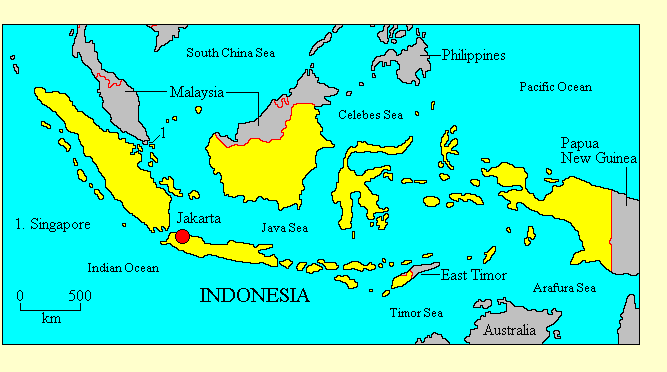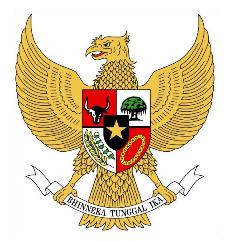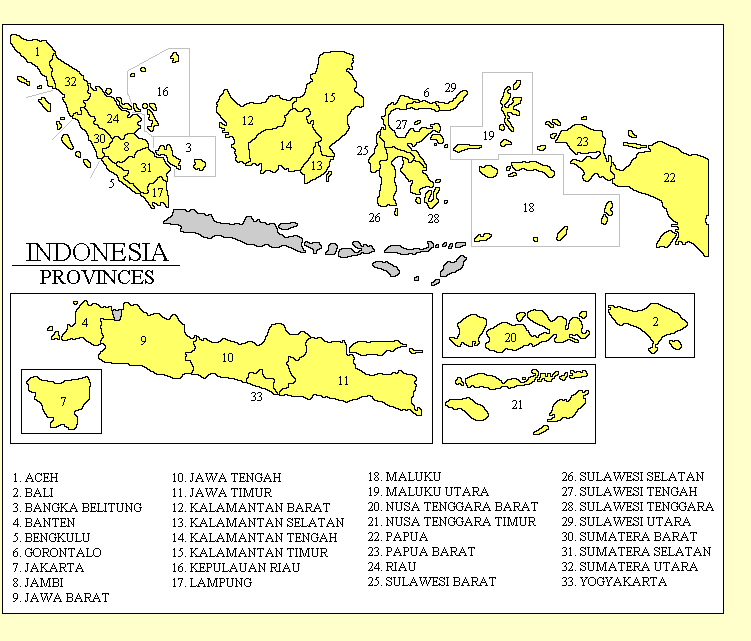
REPUBLIC OF INDONESIA
• Official name: Republik Indonesia (Republic of Indonesia)
• Location: South-East Asia
• International organisations: Asia-Pacific Economic Co-operation Forum, Association of South East
Asian Nations, Group of Twenty, Non-Aligned Movement, Organisation of Islamic Conference, Organisation of Petroleum
Exporting Countries, United Nations, World Trade Organisation
• Borders: East Timor, Malaysia, Papua New Guinea

• Coastline: Arafura Sea, Indian Ocean, Pacific Ocean, Straits of Malacca, Timor Sea
• Land area: 1,919,440 Km2
• Population: 230,000,000
• Annual GDP (PPP) per capita: US$4,000 (2009 CIA estimate). World ranking: 127
• Ethnicity: Most Indonesians are Malayo-Polynesians, including Javanese 45%, Sundanese 14%,
Madurese 7.5%, Malay 7.5%, many others including 2.6% Chinese
• Languages: Bahasa Indonesia, a synthetic Malay language, is the
official language and is widely understood. Most Indonesians also speak
a local language, of which Javanese has the largest number of speakers.
• Religion: Sunni Moslem 88%, Christian 8% (Protestant 5%, Catholic 3%), Hindu 2% (mainly in
Bali), Buddhist 1%
• Form of government: Presidential democracy. Indonesia is divided into
26 provinces and two special districts for Jakarta and Yogjakarta.

• Capital: Jakarta
• Constitution: The
Constitution of the Indonesian Republic, which was proclaimed in August 1945
officially came into effect at Independence, 27 December 1949.
• Head of state: President, directly elected by the people for a five-year term.
• Head of government: The President
• Legislature: Indonesia has a bicameral legislature, the People's Consultative Assembly
(Majelis Permusyawaratan Rakyat, MPR). The House of People's
Representatives (Dewan Perwakilan Rakyat, DPR) has 560 members, elected for five-year terms by
proportional representation in multi-member constituencies. The Regional Representative Council
(Dewan Perwakilan Daerah, DPD) has 132 members, four from each province regardless of population,
elected for five-year terms, officially on a non-partisan basis, although many members have known
party affiliations.
• Electoral authority: The National
Election Commission conducts elections.
• Freedom House 2011 rating: Political Rights 2, Civil Liberties 3
• Transparency International Corruption Index: 28% (110 of 178 countries rated)
• Reporters Without Borders Press Freedom 2010 Index: 64.2% (117 of 178 countries rated)
• Heritage Foundation Economic Freedom 2010 Index: 56% (116 of 179 countries rated)
Political history
The Indonesian archipelago was brought under Dutch control between
the 17th and 19th centuries, and was called the Netherlands East Indies. A
nationalist movement developed from 1908, and seized the opportunity of
the Japanese occupation of the country from 1941 to declare independence
in August 1945. After bitter resistance, the Dutch recognised Indonesian independence in December
1949 and the independence leader Sukarno became President.
Parliamentary elections were held in 1955, but thereafter Sukarno's regime
became increasingly authoritarian. In September 1965 the Army moved
against what it said was an attempted Communist revolution. In the consequent chaos
an estimated 500,000 people were killed. Sukarno was forced to resign and the Army
leader General Suharto became President in 1967. During Suharto's 30-year
reign a facade of parliamentary government was created, but elections
were carefully controlled by the regime.

In 1998 a mounting political and economic crisis forced Suharto to resign,
and Indonesia's first free legislative elections were held in June 1999.
The party of Megawati Sukarnoputri, Sukarno's daughter, won the most seats,
but the legislature chose Abdulrahman Wahid as President. Wahid's physical incapacity following a stroke
led him to resign in July 2001 and Megawati became President. During this period
Indonesia reluctantly accepted the independence of East Timor. Megawati proved an indolent and
indecisive president, and in 2004 she was defeated by a former general,
Susilo Bambang Yudhoyono, known as SBY.
He was easily elected to a second term in 2009.
Indonesia now holds the title of South-East Asia's most successful democracy, a remarkable
achievement in a country where only 15 years ago military rule seemed permanent and unchallenged.
The dominant party is now SBY's Democratic Party PD,
which espouses institutional reform and free-market economics. Megawati's party, the Democratic
Party of Indonesia (Struggle) (PDI-P), is now a declining personal vehicle. The former ruling party,
Golkar, now represents various
commercial interests and is part of SBY's coalition. The
Prosperous Justice Party represents a relatively
moderate form if Islamism. These four parties between them won 70% of the seats at the April 2009
legislative election.
Freedom House's 2011
report on Indonesia
says: "Indonesia is an electoral democracy... Corruption remains endemic, including in the parliament and other key
institutions... Indonesia is home to a vibrant and diverse media environment, though press freedom remains hampered
by a number of legal and regulatory restrictions... Freedom of assembly is usually upheld, and peaceful
protests are commonplace in the capital... Indonesia hosts a strong and active array of civil society organisations,
though some human rights groups are subject to monitoring and interference by the government...
The judiciary, particularly the Constitutional Court, has demonstrated its independence in some cases, but the court
system remains plagued by corruption and other weaknesses... A number of districts began issuing local ordinances based
on Sharia (Islamic law) in 2006. Many are unconstitutional, contradict international treaties to which Indonesia is a
signatory, or are unclear, leading to enforcement problems... Members of the security forces regularly go unpunished
for human rights violations."
Updated November 2011
|


